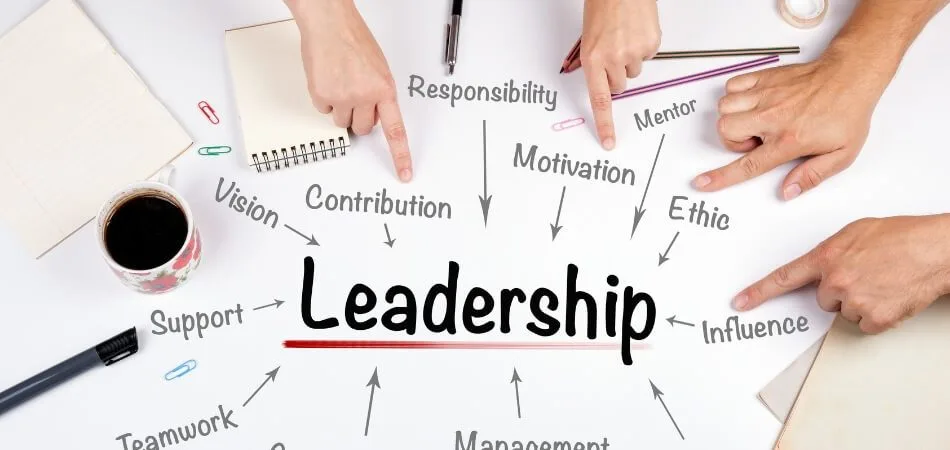Conferences are more than just venues for learning; they’re dynamic platforms for personal growth, particularly in leadership. In this blog, we dive into how to develop leadership skills in a conference and explore effective strategies to uplift your leadership capabilities.
To develop leadership skills, active participation in conference discussions is key, allowing you to voice your ideas and listen to others. Networking with a diverse group of attendees broadens your perspective and builds connections. Seeking mentorship opportunities and engaging in problem-solving sessions refine your decision-making and strategic thinking.
Furthermore, volunteering for leadership roles or presentations significantly enhances your communication and team-building skills. If you’re interested? Keep reading to uncover more insights on transforming your conference experience into a leadership development journey.
The Importance of Leadership Skills in a Conference
Leadership skills play a pivotal role in the success of any conference, both for organizers and attendees. Whether you are leading a team or presenting a session, strong leadership abilities can make all the difference. Here are some key reasons why leadership skills are important in conferences.
- Effective Communication: Leadership requires clear and effective communication. During conferences, leaders must articulate their ideas confidently, whether they’re presenting, leading discussions, or coordinating activities. Strong communication helps engage the audience and ensures everyone understands the key messages.
- Inspiring Collaboration: Leaders know how to inspire and encourage collaboration among participants. By fostering teamwork and inclusivity, conference leaders can create an environment where attendees feel comfortable sharing ideas, contributing, and building connections that may lead to future collaborations.
- Decision-Making: Quick and thoughtful decision-making is essential in the fast-paced environment of a conference. Whether it’s solving logistical issues or making on-the-spot adjustments, leaders must think critically and make decisions that benefit the overall experience.
- Problem-Solving: Unexpected challenges can arise during conferences, from technical glitches to scheduling conflicts. Strong leaders are problem-solvers who remain calm under pressure and quickly find solutions to keep things running smoothly.
- Mentorship: Leadership skills help guide others during conferences. By offering support, guidance, and mentorship, leaders can help others maximize their conference experience, leaving a lasting positive impact.
Leadership skills are crucial for creating a successful and impactful conference experience. These skills ensure a successful, engaging, and productive conference for everyone involved.
How to Develop Leadership Skills in a Conference?
Developing leadership skills in a conference setting is an excellent way to enhance your professional capabilities. Conferences offer a unique environment for learning, networking, and practicing leadership in real time. It is easier to develop leadership skills in a conference since it is a platform to interact with diverse professionals and learn from experienced leaders. Here’s a step-by-step guide to make the most of your conference experience for leadership development.
Step 1: Active Participation in Discussions
Engage actively in conference discussions and seminars. This demonstrates your willingness to contribute and learn. By voicing your opinions and ideas, you develop assertiveness and confidence, essential traits of a leader. It also improves your ability to articulate thoughts clearly and persuasively.
Step 2: Network with Diverse Attendees
Use the opportunity to connect with people from various backgrounds and industries. Networking is not just about exchanging business cards; it’s about building meaningful relationships. These connections can provide new insights, mentorship opportunities, and collaboration prospects. A good leader knows the value of a diverse network.
Step 3: Seek Mentorship Opportunities
Identify and approach potential mentors during the conference. A mentor can provide guidance, feedback, and support in your leadership journey. Engaging with experienced professionals offers a chance to learn from their successes and challenges. This relationship can be a valuable source of wisdom and inspiration.
Step 4: Engage in Problem-Solving Sessions
Participate in workshops or sessions focused on problem-solving. These sessions enhance your critical thinking and decision-making skills. They simulate real-life challenges, allowing you to practice resolving conflicts and strategizing effectively. Handling complex scenarios effectively is a key leadership skill.
Step 5: Volunteer for Leadership Roles
If possible, volunteer to organize or lead parts of the conference. This can be moderating a session, leading a discussion group, or helping in event management. Such roles provide practical experience in leading teams and managing tasks. It’s a hands-on approach to leadership.
Step 6: Reflect and Apply Learning
Post-conference, take time to reflect on your experiences and lessons learned. Identify areas for improvement and plan how to apply these insights in your professional life. Continuous learning and application of new skills are vital for leadership growth.
By following these steps, a conference can become a transformative experience for emerging leaders. It’s about taking initiative, engaging actively, and applying the learnings to your leadership journey.
Can Attending a Conference Help Someone Become a Better Leader?
Yes, attending a conference can indeed be a stepping stone towards becoming a better leader. These gatherings provide unique opportunities for learning, networking, and personal development. They’re a melting pot of ideas, experiences, and expertise from diverse fields.
Exposure to New Perspectives
Conferences bring together people from various backgrounds, offering a wealth of new viewpoints. This exposure broadens the understanding of a listener in conference and gives ideas about different industries and cultures. It encourages open-mindedness, an essential trait for effective leadership. Leaders learn to appreciate diverse approaches to problem-solving.
Skill Enhancement Workshops
Many conferences offer workshops focusing on leadership skills. These sessions provide practical, hands-on experience in areas like communication and team management. Participants learn from experienced leaders and trainers. They offer a safe space for practicing new techniques.
Networking Opportunities
Networking is a significant aspect of conferences. Leaders can connect with peers, mentors, and industry experts. These relationships can lead to collaborations and mentorship opportunities. Networking helps in exchanging ideas and gaining insights from experienced professionals.
Learning from Success Stories
Conferences often feature talks and panel discussions by successful leaders. Hearing these success stories can be incredibly inspiring. It provides practical examples of effective leadership in action. Leaders can learn valuable lessons from the experiences of others.
Personal Development
Attending a conference contributes to personal growth. Leaders are challenged to step out of their comfort zones. They develop better public speaking and social skills. These personal developments are crucial in shaping a well-rounded leader.
A conference is not just an event, but a multifaceted experience that fosters leadership growth. By participating actively, one can emerge as a more capable and confident leader.
Factors to Keep in Mind While Developing Leadership Skills
Developing leadership skills is an ongoing journey that requires self-awareness, commitment, and a willingness to grow. Whether you’re stepping into a new leadership role or sharpening your abilities, certain factors can help guide your development and ensure you’re building strong, effective leadership qualities.
Self-Awareness
Knowing your strengths, weaknesses, and emotional triggers is essential for growth. Self-aware leaders can manage their reactions, make better decisions, and create a more empathetic work environment. Regular self-reflection helps you adapt and progress.
Communication Skills
Effective leaders communicate clearly and listen actively. Mastering both verbal and non-verbal communication can help you inspire and guide your team. Make sure to listen to feedback and address concerns to promote trust.
Adaptability
Leadership requires the ability to adjust in the face of challenges or changes. Flexibility helps you stay grounded during tough times and encourages your team to remain resilient, no matter what obstacles arise.
Empathy
Knowing and relating to your team members on an emotional level builds trust and loyalty. Empathetic leaders create a supportive environment where people feel valued and understood, which fosters collaboration and innovation.
Continuous Learning
Leadership is a lifelong learning process. Stay open to feedback, pursue professional development, and learn from both successes and failures. A growth mindset keeps you evolving as a leader and enables you to better serve your team.
Focusing on these factors will help you develop the leadership skills needed to inspire others and succeed in any professional environment.
How Does Effective Communication in Conferences Help Develop Leadership Skills?
Effective communication plays a crucial role in bringing up leadership skills during conferences. These gatherings serve as invaluable platforms for personal and professional growth. By employing efficient communication techniques, especially, students and learners can capitalize on these opportunities and uplift their leadership prowess. Effective communication is considered one of the remarkable advantages of conference participation for grad students looking forward to developing leadership skills.
Building Harmony with Attendees
Effective communication helps in establishing rapport with other conference attendees. It’s about listening actively and showing genuine interest in others’ perspectives. This not only creates a comfortable environment but also opens doors for meaningful conversations. Good rapport is foundational for future collaborations and mentorship opportunities.
Enhancing Presentation Skills
Leadership often involves presenting ideas compellingly. Conferences provide a platform to practice and refine your presentation skills. Effective communicators can convey their message clearly and engage their audience. This skill is crucial for leaders to inspire and motivate their teams.
Facilitating Group Discussions
Leaders often find themselves leading or participating in group discussions. Effective communication ensures these discussions are productive and inclusive. It’s about encouraging participation, managing conflicts, and summarizing key points. These abilities are essential for a leader to guide a team towards consensus.
Networking Effectively
Networking is more than exchanging business cards; it’s about establishing connections. Effective communication skills are vital for successful networking. They help in articulating your value proposition and understanding others’ needs. Strong networks are invaluable assets for any leader.
Gathering Insights and Feedback
Conferences are rich sources of feedback and new ideas. Effective communicators are adept at asking the right questions and listening to feedback. This input is crucial for personal and professional development. Leaders who can integrate feedback into their practice show adaptability and growth.
Demonstrating Thought Leadership
Effective communication allows leaders to share their knowledge and insights. Conferences provide a stage to establish oneself as a thought leader in a field. Articulating complex ideas in an accessible manner enhances credibility and influence. Thought leadership is a powerful tool for inspiring and leading others.
By honing these skills, aspiring leaders can maximize their conference experiences, paving the way for professional growth and success.
FAQs
Here are some relevant questions on how to develop leadership skills in a conference. We have provided suitable answers to the questions to give you a wide perspective.
How Can Networking at a Conference Help in Developing Leadership Skills?
Networking allows you to connect with experienced leaders, learn from their journeys, and build relationships. By initiating conversations and collaborations, you can practice and improve your interpersonal and leadership skills.
How Can I Actively Participate in a Conference to Develop Leadership Skills?
Actively participate by asking questions during sessions, volunteering for panel discussions, or joining committees. Engaging in these activities helps you practice public speaking, decision-making, and networking, which are key leadership skills.
Why is Mentoring at Conferences Beneficial for Leadership Growth?
Mentoring, whether as a mentor or mentee, enhances leadership skills by fostering learning, guidance, and the exchange of knowledge. It helps build your coaching abilities and provides insights into different perspectives.
What Strategies Can I Use to Showcase My Leadership Potential at a Conference?
Share your insights during discussions, propose innovative ideas, or present your research confidently. Demonstrating initiative and a willingness to contribute positions you as a proactive and capable leader.
How Can Presenting at a Conference Boost My Leadership Skills?
Presenting your work improves your ability to communicate complex ideas clearly and persuasively, which is crucial for leadership. It also builds confidence and establishes you as an authority in your field.
Conclusion
In exploring the multifaceted approach to leadership development, conferences emerge as key platforms for growth. They offer unique opportunities to engage, learn, and build networks, essential for any emerging leader.
How to develop leadership skills in a conference is the central query of this article where active participation and diverse networking play pivotal roles. These environments foster skills like effective communication, strategic thinking, and team building, all critical for leadership.
The journey concludes with reflection and application, turning experiences into tangible leadership growth. This process, encompassing learning and practice, shapes individuals into leaders who can inspire and guide effectively in various spheres of life.








